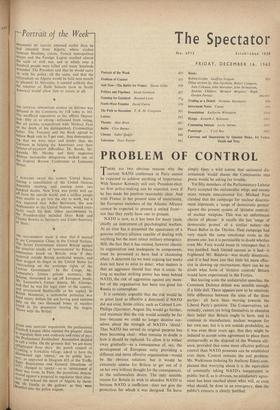PROBLEM OF CONTROL
THERE are two obvious reasons why the current NATO conference in Paris cannot be expected to achieve anything of importance. With Senator Kennedy still only President-elect, no firm policy-making can be expected, even if he has made his position reasonably clear. And with France in her present state of uncertainty, the European members of the Atlantic Alliance cannot be expected to present a united front— not that they really have one to present.
NATO is now, as it has been for many years, chiefly an instrument of psychological warfare. At no time has it presented the appearance of a genuine military alliance capable of dealing with anything but the most minor military emergency. Still, the fact that it has existed, however chaotic its organisation and inadequate its components, must be presumed to have had a chastening effect. A deterrent (as we were arguing last week) does not have to exist to deter; what matters is that an aggressor should fear that it exists. So long as nuclear striking power has been behind NATO, the risk of aggression against any mem- ber of the organisation has been too great for Russia to contemplate.
It is certainly arguable that the risk would be as great (and as effective a deterrent) if NATO did not exist. Some critics, such as Colonel Lort- Phillips (Spectator, August 26), would go further, and maintain that the risk would actually be far less—because we could no longer deceive our- selves about the strength of NATO's 'shield.' That NATO has served its original purpose has been becoming clear : what remains in doubt is how it should be replaced. To allow it to wither away gradually—as a consequence of, say, the development of European unity providing a different and more effective organisation—would be the obvious solution; but it would be extremely unwise for Britain to get out of it on her own without thought for the consequences, as the unilateralists desire. The only sensible reason for Britain to wish to abandon NATO is because NATO is inefficient—does not give the protection for which it was designed. To leave simply from a wild notion that unilateral dis- arniament would shame the Communists into peace would be asking for trouble.
Yet fifty members of the Parliamentary Labour Party accepted the unilateralist whip; and twenty more remain unaccounted for. Michael Foot . claimed that the campaign for nuclear disarma- ment represents a 'surge of democratic protest' against the present system of 'dictator controls' of nuclear weapons. This was an unfortunate choice of phrase : it recalls the last 'surge of democratic protest' of a similar nature—the Peace Ballot in the Thirties. That campaign had very much the same emotional roots as the present one; but it is permissible to doubt whether even Mr. Foot would boast in retrospect that it was justified. Such limited success as it had—it frightened Mr. Baldwin—was nearly disastrous; and if it had been just that little bit more effec- tive in slowing up rearmament, there can be no doubt what form of 'dictator controls' Britain would have experienced in the Forties. But leaving aside the unilateralist speeches, the Commons Defence debate was sensible enough, if a little dull. There appears now to be relatively little difference between the aims of the three parties : all have been moving towards the Liberal Party's position. The Conservatives, ad- mittedly, cannot yet bring themselves to abandon their belief that Britain ought to have, and to continue to manufacture, nuclear weapons for her own use; but it is not outside probability, as it was even three years ago, that they might be induced to accept some agreement to place them unreservedly at the disposal of the Western alli- ance, provided that some more effective political control than NATO possesses can be established over them. Control remains the real problem. Mr. Watkinson (echoing Sir Anthony Eden) com- plained that worrying about it is the equivalent of constantly taking NATO's temperature in public; but if, as is obvious, no satisfactory agree- ment has been reached about what will, or even what should, be done in an emergency, then the public's concern is clearly justified.


































 Previous page
Previous page